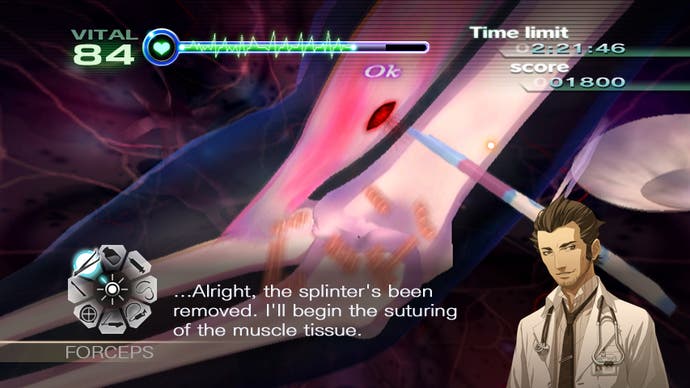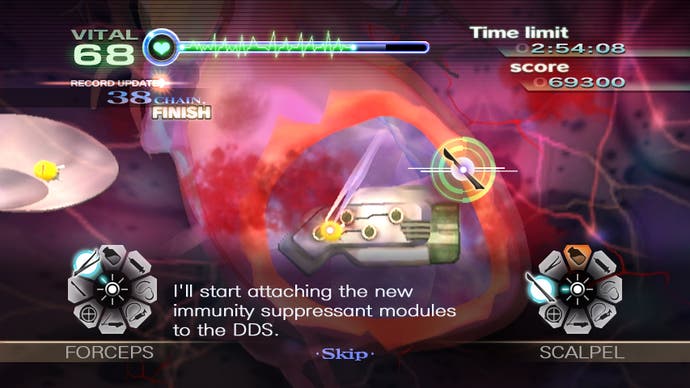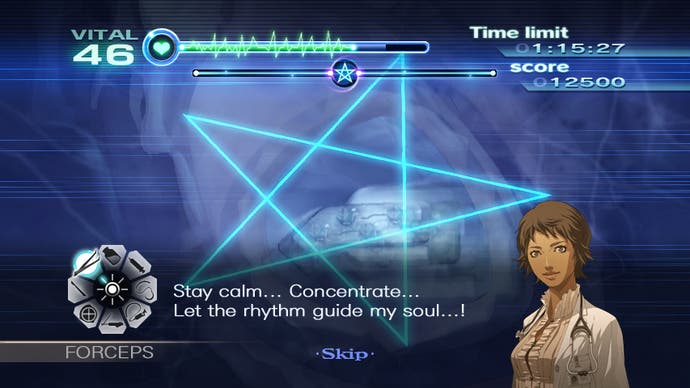Trauma Center: New Blood
Still on the cutting edge.
As I write this, the third season of House is playing in the background. If you haven't seen this medical drama series, by the way, then go out and buy Season One right this second. It's a bit like a murder mystery, except the murderers are all ridiculously obscure and unlikely diseases and the chief detective is a sardonic bastard of a genius with a limp and some excellent one-liners.
I mention this because I'd bet very good money that somebody closely involved with Trauma Center: New Blood has developed as much of an affection for this series as I have over the past year or two. The opening sequence is so similar to House's opening credits that it borders on plagiarism - right down to the music, fading-in-and-out medical diagrams, even the fonts. It makes me laugh out loud every time I see it.
More than the title sequence, the whole game has taken a turn for the serious in New Blood. Where Second Opinion had the slightly incompetent Dr Derek Stiles with his invariable arm-outstretched pledge of 'I won't let you die!', New Blood has two coolly professional, gifted doctors who start the game working out in Alaska to get away from the pressures of their own talent (or something). Instead of mad Japanese sci-fi nonsense, this time around you spend a good eighty percent of your time doing operations that might conceivably be performed in real life - albeit with Trauma Center's trademark magic healing gel, giant shards of glass hidden in organs and implanted microchips in the brain.

New Blood is a completely original title with a full complement of around fifty operations, unlike Second Opinion, which took the majority of its content from the DS Trauma Center. All of them are designed for either one or two doctors, as New Blood can be played co-operatively. Although you'll often be repeating the basic slicing and dicing found in Second Opinion, in general the operations are more specifically tuned to the Wii's special twisting and turning capabilities. Think the bonus operations from New Blood, and then fill the entire game with equally ingenious and precise control. The variety in the operations is still brilliant, but they're a bit less mad than before; there's no operating on aeroplanes or dismantling bombs here, and much less killing of mutant viruses with lasers. Instead there's brain surgery, replacing pacemakers, skin grafting, organ transplanting and a huge variety of other, slightly more medically believable tasks.
Control-wise, it's exactly the same. You choose your surgical tools with the Nunchuk - scalpel, laser, forceps, ultrasound, et cetera - and operate them with the remote. The game gives you a tense few minutes of story exposition and a briefing before throwing you straight into the operation, usually with a tight time limit before the patient dies at your hands - quite literally. It makes you care, and it makes you save your patients with your own two hands, whether you're using the remote and Nunchuk as defibrillator pads or excising things with scalpel and tongs.
It involves immense skill and accuracy and great steadiness of hand, and is one of the most challenging, tense and occasionally traumatic games I've ever played. Second Opinion is one of my favourite games, and New Blood is brilliant for all the same reasons. It's urgent, tactile, very challenging and completely unique. The fact that such an unusual, fantastic game managed to get a sequel makes me very, very happy indeed. Well done, everyone, for buying it.

It should be said that difficulty spikes and getting completely stuck are still an intrinsic part of the Trauma Center experience. It's never bothered me, but then I continuously seem to prove myself a glutton for punishment with my adoration for games like Amplitude, Guitar Hero III and the original Trauma Center, all of which I've delightedly inched my way through on the hardest setting and all of which have been accused by other reviewers of tremendously unfair difficulty in places. It's perhaps a little worse in New Blood's single-player because the game was to some extent designed for two doctors, but then you can always put the difficulty down. This is essentially a time-limited puzzle challenge game, and I expect it to challenge me until I get better rather than let me sail through the operations unhindered.
So what is different? Every completely new operation in Trauma Center is designed to be played co-operatively, which is where New Blood really adds to what went before it. I'd envisioned myself muttering things like '10 CCs of adrenaline, stat' to my silent and obedient co-doctor, but instead what ended up happening was a bewildering cacophony of 'Green gunk! GREEN GUNK!', 'Quick, laser it whilst I scalpel the whatsit', and 'STICK TO THE RIGHT VENTRICLE, YOU MANIAC'. It's excellent fun - equally matched players can complete the operations together for double-time and high rankings, whereas if you're playing with a novice they can do things like pump the patient's vitals or heal minor cuts whilst you undertake the main surgery.

The story, too, is different, and it's here that I think New Blood doesn't quite capture the insane magic of the original. It's rather like if Phoenix Wright were to start handling traffic charges in court and calling up statutes instead of defending accused murderers with wild guesswork and accusations. It's all a bit ER, and the new GUILT virus (called STIGMA, acronym fans!) isn't nearly as ridiculous a bioterrorist threat as Second Opinion's. The character design is also a bit uncanny. It's obviously trying to be less cartoony than before, but the characters often end up looking very strange in the still cut-scenes between operations, and their expressions often look weirdly constipated. The voiceover work is passable, but it wasn't essential; at least it indicates that Second Opinion did well enough to merit a proper budget for this sequel.
Trauma Center: New Blood is as urgent, highly skilled and compulsive as Second Opinion. Co-operative surgery is very enjoyable, and it has lost none of the tactile excitement that it had last year. What it has lost is that lovable element of the ludicrous - you'll spend far less time operating on bombs and quickly-mutating made-up deadly viruses than you will on people with burns, hemorrhaging, tumours and gunshot wounds this time around. This is a considerably less ridiculous and hysterical sci-fi medical drama than last year's, and as a consequence I just haven't found the story and characters as funny and likeable. Other than that, it's just as distinctively great as it always was.








